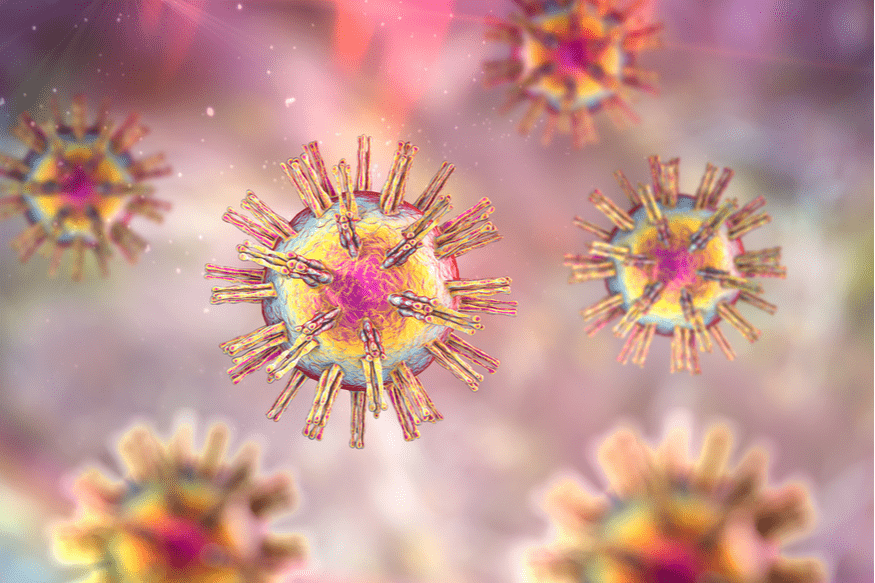
No one minds testing for the coronavirus, but testing for STDs? That’s a different thing.

We test before we go to a festival, before we go on holiday, and if we experience symptoms: the coronavirus test is now an indispensable tool. But what about testing for STDs? What about your sexual health?
Testing for STDs
Testing for STDs is the only way to find out if you’re carrying a sexually transmitted disease. There are many different types of STDs, some of which cause symptoms immediately, others only later. Some don’t have any symptoms at all. Getting yourself tested is one way to know whether you have an STD that needs treatment.
Why should you get tested?
In 2019, nearly 500,000 people were diagnosed with an STD in the UK. Some can have far-reaching consequences if they’re not treated. For example, if a woman has chlamydia and does not treat it, she can become infertile. Fortunately, the risk is small, but it is possible. And if you get infected with hepatitis B, you can be sick for up to 6 months, and sometimes even longer. Untreated syphilis can also cause serious symptoms after years, such as damage to the spinal cord, bones, brain, and heart.
In this day and age, testing is possible and done often, so it’s good to take a close look at your sexual health. Why do we test for COVID-19 before we travel, but not for STDs, even though there’s a chance you’ll have a one-night stand? You can unknowingly infect people if you don’t get tested and still have unprotected sex. In addition, you’ll also suffer from symptoms you’d certainly like to get rid of as soon as possible.
Reading tip: All-natural, organic and vegan sex toys and condoms
Should I test for STDs?
When should you get tested for an STD? There are several reasons to do an STD test.
Unprotected sex
Have you had unsafe sex? Then it’s a good idea to get tested. This doesn’t only apply to a one-night stand with an unknown partner, but also, for example, if you have unsafe sex with a steady sex partner and you’re not sure whether they only sleep with you.
If you want to have sex without condoms
Most people prefer sex without a condom. Do you use another form of contraception and would you like to stop using condoms as a couple? Then it’ a good idea for both of you to get tested. That way, you know that you can have sex safely without a condom.
If you have been warned by a partner or via the health services
You can warn your sex partners through the local health services (anonymously) to tell them that you have an STD. This also means that you can receive a message like that yourself. Get tested, because if you’re warned, one of your sex partners has contracted an STD and you might have it too.
Testing for STDs if you have symptoms
Pain or a burning sensation when urinating, blood and/or mucus during defecation, a change in the amount, colour or smell of discharge, abdominal pain, itching of the anus, or sore testicles: all of these symptoms can indicate an STD. Did you have unprotected sex a few weeks or months before you developed symptoms? Make sure you get tested.
The most common STDs:
- Chlamydia: the most common STD among heterosexual young people. About 60,000 people are diagnosed with chlamydia every year. With this STD, you don’t necessarily experience any physical symptoms.
- Genital warts: these are warts on your genitals. Treatment is often not necessary.
- Gonorrhoea: occurs most frequently among homosexual men. A symptom that can often indicate this disease is fluid coming out of the penis.
- Herpes: with this STD, you can get blisters or sores. This virus stays in your body, so the blisters can come back later, for instance when your immunity is lower due to illness or stress.
- Syphilis: often occurs among homosexual men. You can get sores and swollen glands. Untreated syphilis causes other complaints, such as spots on your hands and feet, or feeling like you’ve caught the flu. Years of untreated syphilis can have far-reaching consequences, as you read earlier in this article.
Other STDs
- Hepatitis B: gay men contract this liver disease more often than women. It’s also common among drug users who share their syringes and among people with partners from countries where hepatitis B is common, such as countries in Asia and Africa.
- HIV: thankfully, the days when HIV was a death sentence are over. The virus will not go away, but with medication, you can live a long and healthy life. You can contract HIV through unprotected sex and blood contact. Homosexual men have a higher risk of being infected with HIV. The HIV virus can develop into AIDS.
- HPV: this is a virus that most people who are sexually active get. It can cause cervical or anal cancer. That’s why it’s possible for girls to be vaccinated against HPV (for free) when they’re 12 or 13. Boys can also be vaccinated nowadays; since 2019, this has been available free of charge.
- Pubic lice: these are lice in your pubic hair, but they can also occur in armpit hair, beard hair, eyelashes, and eyebrows. The lice – also known as crabs – are easy to kill with a prescription cream.
- Scabies: if you’re experiencing intense itching, you may have contracted scabies. It can be transmitted through clothing and bedding. The itching will go away with a cream.
- Shigella: this STD is contracted through anal sex and is more common among homosexual men than women. The bacteria can cause diarrhoea, fever, and abdominal cramps.
- Trichomonas: this STD affects women more than men. Women often suffer from a swollen, red or itchy vagina. Your discharge will look different and may also smell stronger than usual.
Reading tip: HIV and AIDS – Basic facts
Where can I get tested for STDs?
You can get tested for STIs at your GP or at the local health services. If you go to the latter, a test can be offered for free in a few cases, including if you’re younger than 25, if you’ve been warned for an STD, if you experience symptoms, if you’re a sex worker, etc. If you go to the doctor for a test, the visit will be covered by your basic health insurance. The test itself is paid for from the deductible. Are you still on your parents’ health insurance plan, do you not want them to know that you’re getting tested, are you younger than 25, or do you have symptoms? The local health services may be a good option. However, there’s a good chance that your parents have also done a test sometime in the past, so they may be understanding!
How does a test work?
Taking an STD test is simple. Fluid is taken from the vagina (woman) with a cotton swab, men can give a urine sample. In the case of anal complaints, the fluid is removed with a swab by the doctor. Some tests are done by taking blood. This is also done by a doctor.
You cannot get tested immediately after having unsafe sex. For a chlamydia test, for example, you should wait at least 2 weeks. Not every STD (immediately) shows symptoms: for example, after a hepatitis B infection, the complaints only appear after 2-3 months. Are you at risk for an STD? Make sure to get tested regularly, at least twice a year.








Respond or ask a question
0 comments